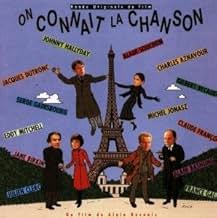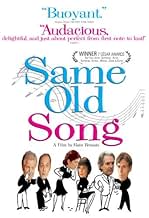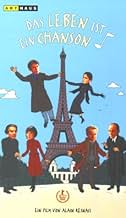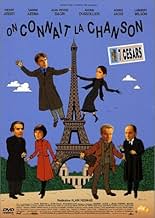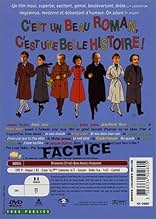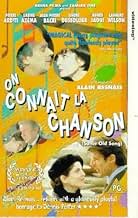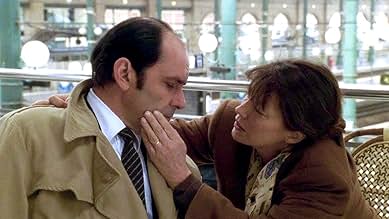VALUTAZIONE IMDb
7,3/10
4583
LA TUA VALUTAZIONE
Una storia musicale su come le persone trovano il loro amore per le strade della bellissima Parigi.Una storia musicale su come le persone trovano il loro amore per le strade della bellissima Parigi.Una storia musicale su come le persone trovano il loro amore per le strade della bellissima Parigi.
- Regia
- Sceneggiatura
- Star
- Premi
- 10 vittorie e 9 candidature totali
Recensioni in evidenza
This film is light, but not empty. Following the interconnected lives of several Parisian bourgeois, the film uses snippets of popular music to demonstrate the emotional state of the characters in the style of a conventional musical. However, the music does both more than this and less. The characters do not sing their parts so much as lip-sync (badly) to tunes that one hears on the radio or in a movie. The songs are related to the characters' "inner lives" as a Nike swoosh or a Dior label would be - and that's the point. Each character has a musical style of sorts and maybe even a theme song, but the song "belongs" to the character like motion "belongs" to a jelly-fish. The characters, like the jelly-fish that are a motif of the finale scene, are less than unique, and much less than in control. However, they are at the same time quite human and sympathetic.
Resnais, whom I count as being one of cinema's great geniuses, has a similar approach in On connaît la chanson as he does in Mon oncle d'Amérique, with pop songs in lieu of mice and jelly-fish in lieu of Henri Laborit. (See the info on the latter movie if this doesn't make sense...) What both films do is make one think about important questions of the complex relationship between brains, minds, and souls, and they do so without clobbering the viewer over the head with preachiness and over-simplifications. Contrast this with the sermonizing of the abominable Lars von Trier (of Dancer in the Dark fame) as well as with the mindless drek that that is generally shown in U.S. theaters.
Resnais, whom I count as being one of cinema's great geniuses, has a similar approach in On connaît la chanson as he does in Mon oncle d'Amérique, with pop songs in lieu of mice and jelly-fish in lieu of Henri Laborit. (See the info on the latter movie if this doesn't make sense...) What both films do is make one think about important questions of the complex relationship between brains, minds, and souls, and they do so without clobbering the viewer over the head with preachiness and over-simplifications. Contrast this with the sermonizing of the abominable Lars von Trier (of Dancer in the Dark fame) as well as with the mindless drek that that is generally shown in U.S. theaters.
Alain Resnais was at the age of 76 when he made his first musical, and to be honest he might just be the last filmmaker I would've guessed to make a musical - even that music has always played a huge part in his films. Alain Resnais was one of the most essential auteurs of the French new wave in early 1960's, during which he got a reputation as an experimental filmmaker by making Hiroshima mon amour (1959) and Last Year at Marienbad (1961) - who would've thought that a man who made these tragic, ambiguous films was going to make a musical? To my mind, through Same Old Song (1997) Resnais achieved the same Hitchcock did; combining experimentalism and populism - the film was drowned by Cesar awards.
In my opinion Same Old Song is the best musical made after the 1960's. Just like western and film-noir so has this genre died. But luckily someone was still able to bring something new to it. Same Old Song is and is not a musical. In the genre wishful thinking, better and dreamed ego, hopes for a better world and existence are combined. From this perspective Same Old Song is a musical but this idyllic joy is destroyed by showing the actual agony and depression that possess the characters. In the film the characters sing in appropriate and inappropriate situations; the music comes from a tape and it doesn't necessarily fit into the mouth of the singer. A young lady can sing throaty and loudly, and a German officer can burst out to a falsetto.
In the beginning there is a Resnaisian leap of time: 50 years, from WWII to the lives of the regardless and ignorant bourgeoisie of today. The reality is very elusive, nothing and no one is what they first seem to be: the inappropriate songs. The characters aren't living in harmony with each other nor with themselves, what the idyllic songs seem to reinforce - it's all a lie, fake, window dressing.
The characters sing classics by Edith Piaf, Serge Gainsbourg and Charles Trenet - same old songs. "No one in our world can sing songs throughly anymore." (Alain Resnais) So all the songs are association; we only here brief fragments from them and this idea works brilliantly. The songs/ideas remain undone and the characters don't empathize. An old Avantgardist goes deeper into the core of art, not by adding but by erasing and simplifying.
Same Old Song could be seen as a parody or a travesty of musicals as the artificial joy wins. But it also has a social dimension; depicting the illusion of bourgeois happiness. The ostensible joy of the same old songs hides the depression, tiredness and panic disorders: "How long does depression last?, - 'Mine has lasted for four years.'" The things of everyday life, falling in love, decent life bury the actual fears of reality. The characters eat a lot and go to cocktail-parties, they don't really know who they are. The postmodern architecture represents the rootlessness of the characters and the vacancy of their lives - Alain Resnais continued from here in his later film Coeurs (2006), which is the best romantic comedy made in decades.
An obscure agony characterizes the city the characters live in. The singing society and artificial happiness are like a horror-utopia - to which not even some of the finest science fictions can't be compared to. Some of the characters realize their agony, share it and move on. But the others continue their artificial idyllic life - singing with no worries.
In my opinion Same Old Song is the best musical made after the 1960's. Just like western and film-noir so has this genre died. But luckily someone was still able to bring something new to it. Same Old Song is and is not a musical. In the genre wishful thinking, better and dreamed ego, hopes for a better world and existence are combined. From this perspective Same Old Song is a musical but this idyllic joy is destroyed by showing the actual agony and depression that possess the characters. In the film the characters sing in appropriate and inappropriate situations; the music comes from a tape and it doesn't necessarily fit into the mouth of the singer. A young lady can sing throaty and loudly, and a German officer can burst out to a falsetto.
In the beginning there is a Resnaisian leap of time: 50 years, from WWII to the lives of the regardless and ignorant bourgeoisie of today. The reality is very elusive, nothing and no one is what they first seem to be: the inappropriate songs. The characters aren't living in harmony with each other nor with themselves, what the idyllic songs seem to reinforce - it's all a lie, fake, window dressing.
The characters sing classics by Edith Piaf, Serge Gainsbourg and Charles Trenet - same old songs. "No one in our world can sing songs throughly anymore." (Alain Resnais) So all the songs are association; we only here brief fragments from them and this idea works brilliantly. The songs/ideas remain undone and the characters don't empathize. An old Avantgardist goes deeper into the core of art, not by adding but by erasing and simplifying.
Same Old Song could be seen as a parody or a travesty of musicals as the artificial joy wins. But it also has a social dimension; depicting the illusion of bourgeois happiness. The ostensible joy of the same old songs hides the depression, tiredness and panic disorders: "How long does depression last?, - 'Mine has lasted for four years.'" The things of everyday life, falling in love, decent life bury the actual fears of reality. The characters eat a lot and go to cocktail-parties, they don't really know who they are. The postmodern architecture represents the rootlessness of the characters and the vacancy of their lives - Alain Resnais continued from here in his later film Coeurs (2006), which is the best romantic comedy made in decades.
An obscure agony characterizes the city the characters live in. The singing society and artificial happiness are like a horror-utopia - to which not even some of the finest science fictions can't be compared to. Some of the characters realize their agony, share it and move on. But the others continue their artificial idyllic life - singing with no worries.
"On connait la chanson" is a great French movie. Not often the culture and lifestyle of a country is shown so happily, modern and still entertainingly in a film. The plot is not "straight", it's rather a patchwork of single stories, that are connected with each other. The French chanson, the title says it, plays a central role. It is this kind of music, though sometimes pretty close to kitsch, that is so typical for France. Instead of expressing their feelings only in words, the protagonists sing lines from well-known chansons, all the way from Maurice Chevalier to Serge Gainsbourgh.
Fortunately, there is no dubbed version of this film, the subtitles do very well. So if you want to know something about France and especially Paris today, go and watch it. Also people who normally don't like foreign films will have a lot of fun with it.
Fortunately, there is no dubbed version of this film, the subtitles do very well. So if you want to know something about France and especially Paris today, go and watch it. Also people who normally don't like foreign films will have a lot of fun with it.
In the unapproximate center of "On connaît la chanson," find a marvelous joke that missed by everyone at the sold out SFIFF screening I attended. If you want to try to catch it yourself, then don't read on! I'm writing to those of you who didn't or won't catch it. Four or five characters are seated chatting or arguing, I forget, round a table in a busy restaurant. As you know from other comments here, the script incorporates line fragments from well-known French songs (kind of like those "hidden picture" puzzles in the dentist office magazine). As each occurs, someone bursts into song. One of our group, after an unremarkable, perfectly conversational pause, says "je ne regret rien," then pauses, as does everyone else round the table. They look at one another, everyone at everyone, the very clatter of the restaurant seems to pause, waiting, and for the only time in this film, nobody takes the cue. Nobody breaks into the Piaf standard.
This film, a tribute to Dennis Potter (pennies from heaven, the singing detective), is the best french comedy I've ever seen. Basically it's a typical well-made french film about relations, with great acting, set in Paris. But it's more than that: it's also a musical. Here are some reasons why I think it's a great movie. First, the chansons, play-backed by the actors, are brilliant. Imagine a Wehrmachtofficer lipsinging to an Edith-Piaf chanson (in the opening act). The best thing about the chansons, is the fact that they actually support the story, as they serve as moments of reflection and introspection for the players. Maybe it's the contrast between the extreme sentimentality and the 'serious' acting that makes this film so great. Go see it.
Lo sapevi?
- QuizThe film is dedicated to the memory of Dennis Potter, and is in the style of Potter's lip-sync musicals like Pennies from Heaven (1978), The Singing Detective (1986) and Lipstick on Your Collar (1993).
- ConnessioniFeatured in 6 à la maison: Episodio datato 27 gennaio 2021 (2021)
- Colonne sonoreJ'ai Deux Amours
Music by Vincent Scotto
Lyrics by Georges Koger and Henri Varna
Performed by Josephine Baker
I più visti
Accedi per valutare e creare un elenco di titoli salvati per ottenere consigli personalizzati
- How long is Same Old Song?Powered by Alexa
Dettagli
- Data di uscita
- Paesi di origine
- Sito ufficiale
- Lingue
- Celebre anche come
- Same Old Song
- Luoghi delle riprese
- Hôtel Meurice - 228 Rue de Rivoli, Paris 1, Parigi, Francia(opening scene: Camille tells about von Choltitz in front of the hotel)
- Aziende produttrici
- Vedi altri crediti dell’azienda su IMDbPro
Botteghino
- Budget
- 7.900.000 € (previsto)
- Tempo di esecuzione
- 2h(120 min)
- Colore
- Mix di suoni
- Proporzioni
- 1.85 : 1
Contribuisci a questa pagina
Suggerisci una modifica o aggiungi i contenuti mancanti

